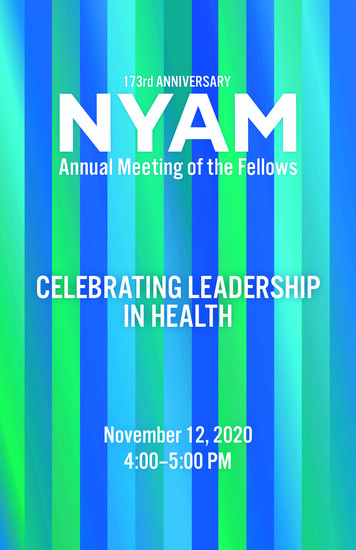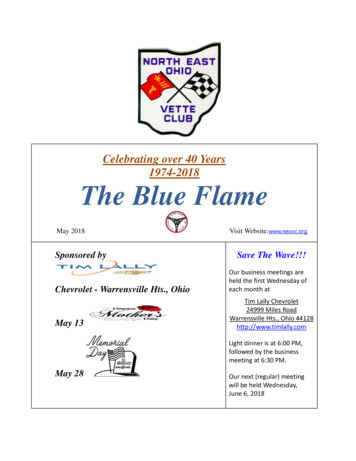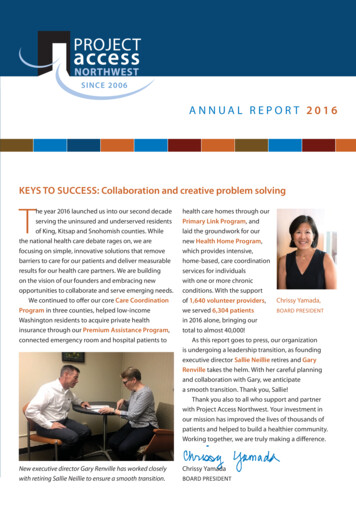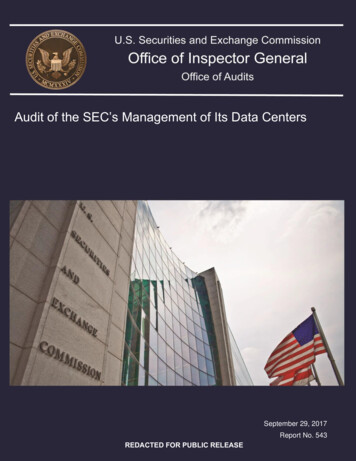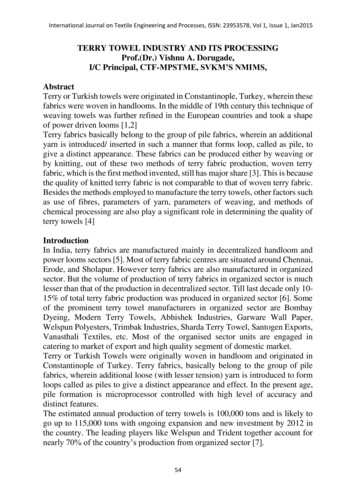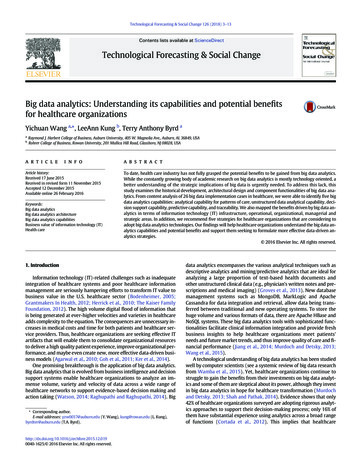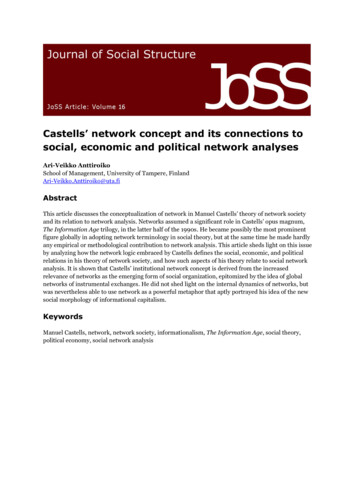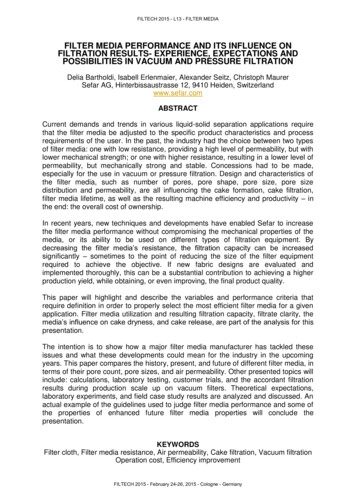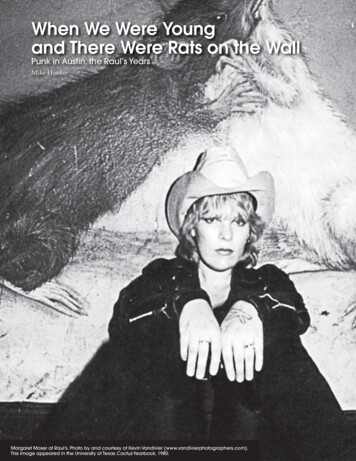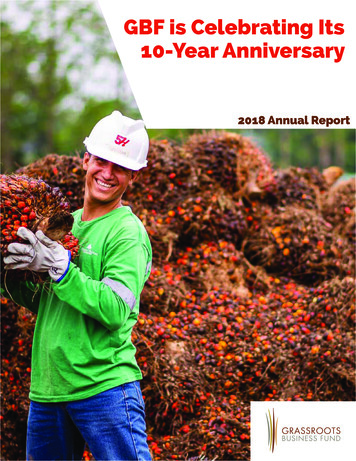
Transcription
GBF is Celebrating Its10-Year Anniversary2018 Annual Report
Dear Friends,We are pleased to present GBF’s Annual Report for the financial year ended on June30, 2018. This year’s report focuses on our continued regional presence in Africa, LatinAmerica and South Asia, the sustainable development goals met, and the overallimpact we have had over the past 10 years. We also cover the lessons learned andexperience we have gained working with SME’s and delivering BAS over the years.This year completes 10 years since our spinoff from the International FinanceCorporation, the private sector arm of the World Bank Group. During this decade,we have evolved, improved on many fronts, and made a meaningful & sustainabledifference in the lives of 3,396,572 low-income people with income generation and costsavings.GBF’s mission and values remain intact. helping hard to reach groups, making adifference in the lives of large numbers of low-income people; and in so doing, setmodels that can benefit the field of impact investing, helping reach more things formore people, especially ones who are outside the reach of traditional market sources.In so doing, we have developed a lot of knowledge-some of which has led toimprovements in our own efficiency and effectiveness. Through our lessons learnedwe have experienced first hand the best techniques to help others— whether that beengaging with global and regional players, country governments, and the like. Ourexpertise is reflected in the paid advice GBF provides to governments, NGOs andagencies.Also given opportunities to raise more capital, we are distilling our experience anddevising plans specific to each of the regions. Besides investment vehicles for GBFitself to manage these include more advisory work, and developing tools and modelsthat can be used by many others within the fieldWe are grateful to our many stakeholders, for all their support. And grateful to AndrewAdelson, our chairman for 6 years. Andy remains active on the Board, and also theinvestment side.With his continued support, and that of our new chairperson, Mary Houghton, we areoptimistic about the future and grateful for all the friends and stakeholders who help usrealize our potential.2Harold RosenCHIEF EXECUTIVE OFFICERGBF 2018 Annual ReportMary HoughtonCHAIRPERSON OF THE BOARD
Index4 Introduction5 Our History6 Regional Presence7 SDGs: Sustainable Goals Addressed8 Agribusiness Factsheet9 Gender Equality Factsheet11 Lessons Learned - A Retrospective Lookat the Past 10 Years12 BAS in Action: Featuring Clients in Each RegionBAS Lessons with Testimonials from our Investees14 A Guide to SME Impact Investing from 10 years of Experience15 Our Solutions to SME Challenges16 Social Impact Factsheet18 Measuring Impact19 GBF Team20 Governing Board and Advisors21 Donors to the Not-for-Profit22 Investors in the Fund23 Financial Statements3GBF 2018 Annual Report
About UsThe Grassroots Business Fund (GBF) aims to reduce poverty bybuilding companies which provide sustainable incomes and costsavings for low-income populations in developing nations. GBF’smarket-based approach to poverty alleviation focuses on building“High Impact Businesses” (HIBs) defined as being sustainable andinclusive firms that benefit large numbers of people in our targetcommunities. HIBs do this by generating income or offering affordable,quality products and services. Through a network of mostly field-basedinvestment and business professionals, GBF grows HIBs in two ways:1. Providing tailored investment capital using a high-touchapproach to help build a companies’ business fundamentals2. Providing investees with “Business Advisory Services” (BAS),and connecting them to local industry experts.GBF’s experienced staff has built and refined this model for over adecade, based on direct, on-the-ground experience, investing in over75 companies in Africa, Asia, and Latin America.4GBF 2018 Annual Report
Our History20042008Grassroots Business Initiative (GBI)Originally created as a department within theWorld Bank’s International Finance Corporation(IFC), GBI was founded by Harold Rosen, whopioneered IFC’s SME and microfinance activities inseeking stronger social impact.Grassroots Business Partners (GBP)Following four years of incubation in the InternationalFinance Corporation, GBP became an independentnon-profit organization in 2008 to begin makingfinancial investments in for-profit companies utilizing100% grant funding and delivering BAS.Based in Washington, DC, GBP invested inAgricultural and Artisanal clients, as well asInnovative Finance Companies.2011GBP Grassroots Business InvestorsFund I (GBI-I)Launched a 49M for-profit 10-year limited life fund,Grassroots Business Investors FundGBI-I was created to invest in socially impactful businesses in Africa, Latin America and South Asia, focusing on companies that engage smallholder farmersand artisans in their supply chains.GBP opens up offices in Lima, Peru; Nairobi, Kenya,and New Delhi, India to place a majority of staff onthe ground in order to best cooperate with portfoliocompanies.2018GBF is Celebrating 10 years of Impact1 42.6 million invested in 51 companies.Over 300 Business Advisory Services which in turnhave generated 214 million of income for more than118,000 individuals and 90.5 million of cost savingsfor over 3.2 million individuals directly.5GBF 2018 Annual Report1. All figures are cumulative as of June 2018
RegionalPresenceLatin America:Active in the region since 2008, GBF LatAm has built strong networksand recognition in Peru and Colombia and also has investmentexperience in Bolivia, Ecuador, and Paraguay. In 2012, GBF LatAmopened a regional office in Lima where a team of 5 people workson structuring and managing investments and facilitating a rangeof Business Advisory Services to the investees in the region. GBFhas committed U 19.7M in debt, mezzanine debt and quasi-equityinvestments in 12 high impact businesses and has conducted 44 BASprojects in Peru, Colombia, Bolivia, Ecuador, and Paraguay. From 2011to-date, GBI-I LatAm investees have generated an estimated 128M ofincome to more than 47,000 farmers, artisans, workers, and vendors.Africa:GBF has had a strong presence in Sub Saharan Africa since 2011. InAfrica, GBF has deployed over 12 million of its capital commitmentsin mezzanine, equity, and debt investments into 21 companies acrossEast and Southern Africa, of which 13 have been successfully exited.GBF has conducted over 128 business advisory assignments, generateda total of 21 million in incremental income and 17 million cost savingsand reached over 1.6 million individuals across Africa. GBF investees areoften agribusiness and artisanal-related companies with large supplychains comprised of low-income producers and consumers.South Asia:GBF currently has 6 active investments in India and Indonesia and weare mainly focused on the supervision of existing portfolio companies.To date, GBF has deployed 12 million by way of mezzanine equityand debt instruments into over 17 companies of which 11 have beensuccessfully exited. GBF has carried out over 140 business advisoryservices. The combination of investments and business advisoryservices have supported our investees in generating over 65 millionin income to 38,000 individuals and over 74 million in cost savings toover 1.7 million individuals to date. We are currently open to exploringpartnerships in the region and further sharing our best practices in theregion.6GBF 2018 Annual Report1. All figures are cumulative as of June 2018
SustainableDevelopmentGoalsNo PovertyAbout 70% of the worlds poor live in rural areas where there is little opportunityfor economic mobility, for these agriculture and artisanal activities are the mainpotential sources of income and employment. Agribusiness has been a keysolution to alleviating poverty and providing food security.Check out our Agribusiness Factsheet on page 8 or click here to see how GBF’sinvestments in agribusiness have empowered economic sustainability.Gender EqualityTo date, the fund is estimated to have generated job opportunities for morethan 118,000 women and men (benefiting over 450,000 dependents), andaccess to cost savings goods to more than 16.3 indidviduals their dependentsworldwide. GBF consciously invests in companies that are positioned toprovide opportunities for both men and women. GBF’s impact is not focusedexclusively on women; however, it is of great importance to GBF since investingin women multiplies the impact of an investment, as women spend 90% of theirincome on their households and families while men spend only 30-40%.Check out our Gender Equality Factsheet on page 9 or click here to learn howGBF both embodies and empowers gender equality and throughout our work.Decent Work and Economic GrowthGBF supports SMEs to empower Decent Work and Economic Growth.SME’s play a major role in the economies of low-income countries, providingaround 75% of employment, and 4/5 new jobs. The major shortage ofcapital, business mentoring, and partnerships that SMEs face is a barrier todevelopment for these vehicles of inclusive growth. 50% of SMEs do not haveaccess to formal capital, and without capital, they face lack opportunity andcan stagnate.Reduced InequalitiesGBF empowers individuals in the lower segment of income earners, byproviding financial products and technical assistance to businesses whichalleviate poverty for low-income communities. In every region, GBF promoteseconomic inclusion of all regardless of sex, race or ethnicity.7GBF 2018 Annual Report
AgribusinessGBF Supports Agribusiness CompaniesSocial ImpactIndividual’s DirectlySupported: 60,7601Net Income toFarmers Workersfrom GBF Investees 115 MillionTrack RecordTotal Investedin Agribusiness 29MNumber ofInvestments1 : 40Successful Exits:2067%of GBF’s Portfoliois Focused onAgribusinessGBF has vast experience working with agribusiness companies throughoutSub-Saharan Africa and Latin America. We have evolved our skills and advisoryservices to maximize the effect of our investees. GBF supports companiesalong the agricultural value chain, mostly agri-processors, that connectsmallholder farmers to larger domestic and international markets. Companiesthat partner with GBF benefit from improved access to capital, businessknowledge, and technical support.Why is Investing in AgribusinessOrganizations Worthwhile?Investing in agribusiness companies has the potential to create significanteconomic and social impact for lower income countries and their rural poor.Agriculture is the world’s largest industry and according to the World Bank,70% of the world’s poor live in rural areas. The majority of this population aresmallholder farmers who suffer from chronic food insecurity, low agriculturalyields, and inadequate access to markets.Agribusiness companies often lack access to large or international marketsand require improved farming technologies. GBF’s solution is to invest theneeded capital in companies that employ a high number of smallholderfarmers and workers. This is one of the most effective ways to alleviate povertyas agricultural growth tackles poverty by directly raising incomes, generatingemployment, and passing on sustainable agricultural practices and technologyto farmers.Our Investees3: # of Direct Individuals ImpactedAlamanda 1,930Cavsac 3,380Shared - X Alquimia 4,976Ikanga 3,418Natural Habitats 7,428Appachi 1,349Villa Andina Phoenix Foods 3,486Wamu 8GBF 2018 Annual Report2,6597588171 Note: Some companies have more than one investment2. Figures are cumulative3. Only includes active investees
GenderEqualityGender EqualityGBF EmbodiesGender EqualityAcross AllLevels of ourOrganizationGBF consciously invests in companies that are positioned to provide opportunities for both men and women. GBF’s impact is not focused exclusively on women; however, it is of great importance toGBF since investing in women multiplies the impact of an investment, as women spend 90% of their income on their householdsand families while men spend only 30-40%.Empowering Leadership of Executive Women3 out of 6Board Members(Board Chair is awoman)Growing evidence shows that corporations led by women aremore focused on sustainability. Women in leadership positionscan inspire other women to join such companies, driving anincrease in inclusivity. GBF knows this first hand as both of ourregional directors, our chairperson, and a majority of our talentedstaff are women.Empowering Women Entrepreneurs2 out of 2Regional Directors(50% of theManagementCommittee)9 out of 14 StaffMembers9GBF 2018 Annual ReportTo build future economies that are both dynamic and inclusive,we must ensure that everyone has equal opportunity. If womenare not integrated as workers, suppliers, clients or shapers, theglobal communities lose out on skills, ideas, and perspectivesthat are critical for addressing global challenges and harnessingnew opportunities. About half of our investees are owned and aremanaged by women.GBF invests in women entrepreneurs in Agribusiness, ArtisanalManufacturing, and Products and Services sectors, in threedifferent regions: Latin America, South Asia, and Africa.Women comprise 45% of the world’s working force, yet aredisproportionately affected by poverty. Talented femaleentrepreneurs often lack the resources to profit from their skills.When given the opportunity, women have the power to transformthe global economy. By investing in women entrepreneurs, GBFremoves this barrier and contributes to reducing gender inequalityacross the developing world.
GenderEqualityEmpowering Low-Income Stakeholders50%of the Companies GBFInvested in Over thePast Seven Years areLed by WomenShare of WomenImpacted by ring(income)50%Products andServices10 GBF 2018 Annual ReportGBF is proud to be involved with several investees that supportwomen in countries that have historically disadvantaged women in theworkforce. With GBF’s help, these companies implement environmentaland labor practices that improve women’s work conditions and generateincomes for women farmers, artisans, and micro-entrepreneurs.Over the past seven years, GBF’s investees have delivered an estimated 137.2 million of income and savings to almost 1.7 million womenworldwide.DEYSI NUÑEZ BARBOZAOrganic Mango Farmer - Villa AndinaVilla Andina (VA), an agribusiness in Peru,offers fixed prices to smallholder farmers in itssupply chain protecting them from price dropsin times of overproduction. By selling organicmango to VA and earning a fair and sustainableincome, Deysi has been able to provide highereducation to her kids and improve her home.VA sources from over 1,100 female farmers,50% of the company’s supply chain.RAHMAT JAHANArtisan - Jaipur RugsWith the help of Jaipur Rugs, a GBF investee inIndia, Rahmat overcame community resistanceto become an artisan using her earnings tosupport her and her sister’s education whilepaving the way for future female artisans. JaipurRugs, an Indian handmade rug company,provides employment to over 21,000 femaleartisans, 65% of the company’s workforce.
Lessons LearnedOver the Past10 YearsBAS Lessons Learned:Businesses in emerging markets face major challenges and investments alone are not enoughto scale a business. Our Business Advisory Services (BAS) ensure achievement of client growthpotential by focusing on business fundamentals, anticipating and mitigating key risks, andtaking advantage of key opportunities. This includes providing hands-on managers and advisorswho can assist with financial planning, sustainable environmental practices, and governance.From Experience GBF has Learned:Well-positioned Business Advisory Services can be catalytic for aportfolio company with a wide range of challengesContinuous close engagement with portfolio companies isessential for the success of the businessComplexity and over-defining is sometimes counter-productive tomeaningful improvementsThe most effective interventions are often slow, with gradualdisbursement against progress, milestones, and frequentadaptation over a long period of timeFor HIBs, corporate governance and human capacity are themost challenging core areas in dire need of support. This is mainlybecause most of these businesses are family-owned and run.Despite the challenges that GBF has encountered in deliveringBusiness Advisory Services, our capacity-building approach hasachieved meaningful results for portfolio companies.11 GBF 2018 Annual Report
BAS in Action:FeaturingClients inEach RegionAfricaSoko, Kenya: ERP Technology Platform and Artisan Loyalty ProgramSoko is a GBF portfolio company that designs and manufacturesethically produced, handcrafted jewelry created by artisanentrepreneurs throughout Nairobi, Kenya. In 2016, GBF through its BASinitiative supported Soko in designing and building a Virtual ResourcePlanner (VRP) to manage its supply chain end to end. The VRP supportsthe complete order lifecycle (Design -- Artisan -- The Customer)ensuring artisans are easily connected to their consumers and the globalmarket.The platform has enabled Soko to significantly improve productiontimelines, match real-time production needs with a crowd-sourcedproduction base, and in essence, own a highly efficient and distributedvirtual factory. In addition, GBF supported the launch of a digital loyaltyprogram for Soko’s artisans.South AsiaMother Earth-Industree, India: Artisanal Company: Mother Earth SelfHelp Groups to Promote Women InclusivityApparel brand “Mother Earth” sources their products from producerowned cooperatives designed to economically empower womenartisans and create access to global markets. GBF invested in MotherEarth in 2011, to build up its retail presence and scale their ability to workwith larger numbers of self-help artisan groups in rural India. MotherEarth is currently working with 100 cooperatives across India to providetraining and income generation opportunities.GBFs BAS support has enabled Mother Earth to train over 1,500 artisans,70% of whom are women. Training includes skills such as garmentproduction using power sewing machines and is offered to thosewith no prior experience. All artisans are provided room for growthand encouraged to expand their talent within the organization. Theseself-help groups created economic opportunities for women throughsustainable livelihood solutions.12 GBF 2018 Annual Report
BAS in Action:FeaturingClients inEach RegionLatin AmericaNovica: Artisans for Radius DevelopmentNovica is an inclusive technology company that connects almost 20,000artisans in developing countries to a global consumer market throughNovica’s e-commerce platform. During the past 9 years, GBF hassupported Novica with a number of BAS programs mainly focused onstrengthening their artisan supply chain. In 2017, GBF supported Novica’sefforts to reach out to and establish working relationships with longdistance artisan groups in India, Thailand, Indonesia, Peru, and Mexico.Before introducing the e-commerce platform, Novica’s team effectivelysourced from artisan groups within a 5-hour driving radius of theiroffices, however, especially in large countries it is difficult to reach artisangroups outside of this radius. As a result of GBFs BAS initiative, Novicaon-boarded and engaged almost 200 artisans groups located in remoteareas providing them the opportunity to sell their unique, handmadeproducts to international markets through Novica’s site.13 GBF 2018 Annual Report
ProblemsFaced by SMEs& theSolutionsTheProblems:Impact Investing from10 years of Experience1. Capital does not typically flow to most of the companies who need it.The main reason is the tough environment coupled with enterprise-levelchallenges causing many enterprises to be deemed not “investmentready”. This dilemma keeps modern business elements and techniquesfrom reaching the main mass of enterprises and the low-income peoplethey hope to empow
Grassroots Business Partners (GBP) Following four years of incubation in the International Finance Corporation, GBP became an independent non-profit organization in 2008 to begin making financial investments in for-profit companies utilizing 100% grant funding and deliverin
